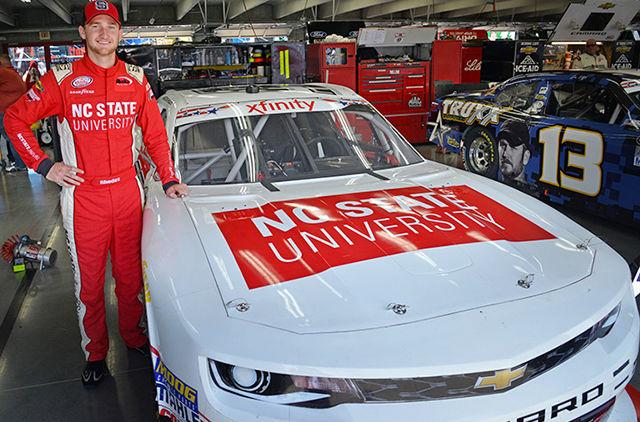Harrison Rhodes is a senior studying business entrepreneurship, but when he’s not sitting in Nelson Hall or Talley Student Union, he’s sitting in a race car, driving at Daytona or Charlotte.
Rhodes began his career as a race car driver at 10 years old, driving quarter-midgets, a sort of souped-up go-kart. Now, Rhodes races in the Xfinity series, one of the three main NASCAR national racing series along with the Camping World Truck Series and the Sprint Cup. Unlike many racers, Rhodes did not inherit the sport from a family member.
“I always played baseball, basketball and your normal sports growing up,” Rhodes said. “My dad was friends with Bobby Labonte, who was a NASCAR driver at the time. His son, Tyler, was in school with me and we became friends. I went and watched one of [Tyler Labonte’s] races one time and I thought they were the coolest thing in the world and I wanted to do it.”
Bobby Labonte let Rhodes practice driving in a small track outside of his shop and Rhodes went on to race quarter-midgets. He raced for four years in Salisbury, North Carolina before moving up to the legend car series. Legend cars are a style of race cars based off of coupes, with typically a 1250cc motor.
“I raced [legends] for two years and competed for a national title, won the state title and actually won 34 of my 60 races that year,” Rhodes said. “Then I moved up to stock cars, which were late models, and I ran those in mostly North Carolina and Virginia. All different forms of stock cars, some with more horsepower, some with less.”
In 2013, Rhodes got the opportunity to start racing in the Xfinity Series, which at the time was still called the NASCAR Nationwide Series. Rhodes raced seven races in his first year, an additional six races in 2014 and, in 2015, Rhodes raced his first full season, all while attending NC State.
“This year, I started off with a new team and not necessarily a full-time ride so I’ve been bouncing around with a couple of teams,” Rhodes said. “What we’re doing right now is trying to get set up for next year so hopefully I can get back in a car full time. That’s what we’re working toward right now.”
Last April, while driving at Bristol, Rhodes found himself in a precarious situation while on the track. His radio, tied to his helmet, came loose and he lost the ability to hear his crew chief and spotter, a line of communication vital to drivers during a race.
“After a couple of laps I noticed some cars near me and realized my headphone jack had came out,” Rhodes said. “I ended up driving one-handed at Bristol so I could use my other hand to find my headphones and plug them back in. I finally got it plugged back in and it came loose again so for about 10 or 15 laps I drove with just my left hand while I help my headphone jack in with my right.”
Rhodes said that with five laps to go, he decided to let go of the headphone jack and resume racing with both hands without a radio.
“I saw there were no cars around me, challenging me, so I just let it go and went on to finish the race and even pass a few cars,” Rhodes said. “Luckily my car was handling pretty well at the time and sometimes in those situations, you’ve got to do what you’ve got to do.”
Rhodes said the process of finding sponsors has encouraged him to pursue his business degree to try and get a leg up on his competition.
“Driving is such a small part of what I do,” Rhodes said. “I spend a lot of time, me and my dad, trying to find sponsors just so I can be in the car.”
Rhodes said that finding a sponsorship in order to improve or replace a driver’s car is incredibly important. He describes a fellow racer who consistently finishes races in the upper 20s suddenly finishing seventh after finding a good team and sponsorship.
“The driver doesn’t necessarily change, but the equipment makes such a difference,” Rhodes said. “Where we’re at is I’ve been in equipment that can run anywhere from 18th to 25th. I had my best finish at Daytona, which was ninth. What we’re after now is trying to get connected with a team that could get me the opportunity to have a lot better finishes. That’s what we are working toward for next year.”
Among Rhodes’ sponsors is NC State. During his full season last year, Rhodes was provided a NC State-branded helmet and fire suit, and for his race in Charlotte last year, a NC State custom-painted race car.
“NC State has been absolutely awesome to me,” Rhodes said. “As far as school goes, professors are for the most part excellent. A lot of them are race fans and when I tell them what I do and what my situation is they’ve been extremely helpful. If I ever miss a test or something, they work with me.”
Brad Bohlander, chief communications officer at NC State, said the university wanted to sponsor Rhodes because he provided the school with a unique opportunity to promote NC State’s leadership in engineering, management and athletics all at once.
“We wanted to get those stories out,” Bohlander said. “NASCAR’s a huge economic driver in the state … I think over $2 billion a year … so we were really interested in telling that story to the industry leaders in motorsports, telling that story to future potential students and telling that story to our alums to build their awareness and pride.”
Rhodes said that racing while going to college full-time can be challenging, but with good time management, he is able to do the best he can. Rhodes continues to wear his NC State helmet and suit in most races.








